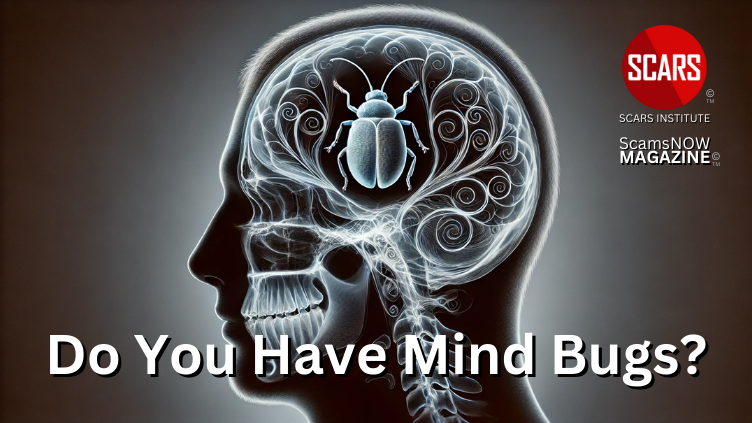Mind Bugs and Scam Victims
The Mind Bugs Behind Scams: How Faulty Thought Patterns Make Us Vulnerable – Scam Victims Especially!
Primary Category: Scam Victim Psychology
Authors:
• Vianey Gonzalez B.Sc(Psych) – Licensed Psychologist, Specialty in Crime Victim Trauma Therapy, Neuropsychologist, Certified Deception Professional, Psychology Advisory Panel & Director of the Society of Citizens Against Relationship Scams Inc.
• Tim McGuinness, Ph.D., DFin, MCPO, MAnth – Anthropologist, Scientist, Polymath, Director of the Society of Citizens Against Relationship Scams Inc.
About This Article
Scams don’t just thrive on clever tactics; they exploit vulnerabilities in how we think. These “mind bugs”—cognitive biases and flawed thought patterns—play a critical role in making individuals susceptible to scams and complicating their recovery afterward. Whether it’s confirmation bias convincing someone that a scam aligns with their goals or authority bias leading them to trust impostors, scammers are adept at manipulating these mental glitches. For scam victims, mind bugs can perpetuate feelings of guilt, shame, and emotional distress, hindering healing and instilling irrational self-blame.
Understanding and counteracting these cognitive vulnerabilities is vital for prevention and recovery. By fostering mental immunity—practicing critical thinking, pausing before acting, and challenging emotional responses—individuals can better protect themselves from manipulation. Moreover, supporting victims with compassion and encouraging professional guidance can help them overcome the lingering effects of trauma and reclaim their sense of control. Ultimately, awareness of these mind bugs offers a path to resilience in the face of deception.

The Mind Bugs Behind Scams: How Faulty Thought Patterns Make Us Vulnerable – Scam Victims Especially!
When we think about scams, we often focus on the deceptive tactics scammers use. However, an equally critical factor lies within our own minds: cognitive vulnerabilities called by some as “mind bugs.” These are misleading thought patterns or mental glitches that can impair reasoning, create irrational beliefs, and lead to poor decision-making. Understanding how mind bugs operate—and how to counteract them—is essential for scam victims and anyone looking to protect themselves from any form of manipulation.
While the term ‘mind bugs’ is not precise or technical, it does offer a way to remember the causes and effects of these decision influencing factors.
What Are Mind Bugs?
Mind bugs are a combination of cognitive biases, logical fallacies, irrational schemas or beliefs, or errors in thinking that subtly distort how we process information. Like viruses infecting the body, they can influence judgment and decision-making, often without us realizing it. Scammers exploit these mind bugs to manipulate emotions, create urgency, or bypass critical thinking.
Here are a few common examples:
Confirmation Bias: Victims focus on information that supports their hopes and beliefs, such as believing in the legitimacy of a scam offer because it aligns with their financial goals, while ignoring red flags.
Authority Bias: Scammers posing as trusted figures—such as government officials, tech support, or bank representatives—capitalize on our tendency to trust perceived authority figures without question.
Availability Heuristic: Victims overestimate the likelihood of a scam being legitimate because similar claims (e.g., “winning a lottery”) are easily recalled from advertisements or media.
Scarcity and Urgency Bias: Scammers use time-sensitive offers or limited availability to create a sense of urgency, preventing victims from taking the time to evaluate the situation logically.
How Mind Bugs Affect Scam Victims
For scam victims, mind bugs play a dual role. Initially, they make individuals more susceptible to scams by impairing judgment. After the scam, these same cognitive biases can prolong emotional distress and hinder recovery:
Hindsight Bias: Victims may harshly blame themselves for “missing obvious signs,” even though the scam was designed to be deceptive.
Self-Serving Bias: Conversely, some victims may rationalize their participation by shifting blame entirely to external factors, preventing them from addressing vulnerabilities.
Emotional Reasoning: Trauma from the scam can lead victims to believe false narratives like “I’m not smart enough” or “I’ll never recover,” based solely on their feelings rather than objective facts.
Understanding these thought patterns is critical for scam prevention and recovery, as recognizing how scammers exploit mind bugs can empower individuals to protect themselves and heal.
How Scammers Exploit Mind Bugs
Scammers are experts at manipulating these cognitive vulnerabilities. By creating situations that seem urgent, emotionally charged, or authoritative, they bypass critical thinking and trigger impulsive decisions.
For instance:
Emotional Appeals: Romance scammers exploit emotional reasoning by building trust and affection, leading victims to send money or reveal personal information.
Fear Tactics: Tech support scams use fear and authority bias by claiming a victim’s computer is infected, pressuring them into granting access or paying for unnecessary services.
Social Proof: Pyramid schemes rely on testimonials and the appearance of widespread success to convince victims that participation is safe and profitable.
Understanding these tactics can help individuals recognize when their emotions or biases are being manipulated.
Enhancing Mental Immunity Against Scams
Developing “mental immunity” is about recognizing and countering mind bugs, fostering rational thinking, and building resilience against scams. Here’s how to protect yourself:
Learn About Common Scams: Familiarity with scam tactics helps you recognize red flags and avoid falling into psychological traps.
Pause Before Acting: Scammers thrive on urgency. Take a moment to evaluate claims, verify sources, and consult trusted individuals before making decisions.
Challenge Emotional Responses: If you feel fear, excitement, or urgency, ask yourself whether these emotions are clouding your judgment. Scammers often use these feelings to override critical thinking.
Seek Verification: Verify information independently. Check credentials, contact official sources, and never rely solely on what the scammer provides.
Practice Self-Compassion: If you’ve been scammed, avoid self-blame. Recognize that scams are designed to exploit even the most rational individuals.
Recognizing the Mind Bugs of Trauma in Scam Victims
After falling victim to a scam, mind bugs can perpetuate emotional distress and hinder recovery. For example:
Catastrophizing: Victims may believe the scam has ruined their lives completely, ignoring opportunities for recovery.
Overgeneralization: A single scam may lead to mistrust of all online interactions or relationships, which can isolate victims further.
Cognitive Dissonance: Victims may struggle to reconcile their belief in their intelligence with the fact that they were deceived, leading to feelings of shame or denial.
Recognizing these patterns is the first step toward overcoming them. Victims can work to reframe their experiences as learning opportunities, rather than definitive failures, and seek professional support when needed.
Supporting Scam Victims with Compassion
Friends and family of scam victims can play a critical role in helping them recognize and address mind bugs. Offer reassurance that being scammed does not define their intelligence or worth. Encourage them to talk openly about their experiences and guide them toward professional resources or support groups to aid in their recovery.
A Cautionary Tale for All
The story of mind bugs and scams is a cautionary tale about the vulnerabilities in human thinking. Scammers exploit the same cognitive shortcuts that help us navigate everyday life, turning our natural tendencies into weaknesses. By understanding these patterns and fostering mental resilience, we can better protect ourselves and support others who have been affected.
Ultimately, mental immunity against scams is not just about recognizing external threats but also about understanding how our own minds can be tricked. Awareness, critical thinking, and compassion—both for ourselves and others—are the keys to staying safe and fostering recovery in the digital age.
-/ 30 /-
What do you think about this?
Please share your thoughts in a comment below!
Statement About Victim Blaming
SCARS Institute articles examine different aspects of the scam victim experience, as well as those who may have been secondary victims. This work focuses on understanding victimization through the science of victimology, including common psychological and behavioral responses. The purpose is to help victims and survivors understand why these crimes occurred, reduce shame and self-blame, strengthen recovery programs and victim opportunities, and lower the risk of future victimization.
At times, these discussions may sound uncomfortable, overwhelming, or may be mistaken for blame. They are not. Scam victims are never blamed. Our goal is to explain the mechanisms of deception and the human responses that scammers exploit, and the processes that occur after the scam ends, so victims can better understand what happened to them and why it felt convincing at the time, and what the path looks like going forward.
Articles that address the psychology, neurology, physiology, and other characteristics of scams and the victim experience recognize that all people share cognitive and emotional traits that can be manipulated under the right conditions. These characteristics are not flaws. They are normal human functions that criminals deliberately exploit. Victims typically have little awareness of these mechanisms while a scam is unfolding and a very limited ability to control them. Awareness often comes only after the harm has occurred.
By explaining these processes, these articles help victims make sense of their experiences, understand common post-scam reactions, and identify ways to protect themselves moving forward. This knowledge supports recovery by replacing confusion and self-blame with clarity, context, and self-compassion.
Additional educational material on these topics is available at ScamPsychology.org – ScamsNOW.com and other SCARS Institute websites.
-/ 30 /-
What do you think about this?
Please share your thoughts in a comment below!
3 Comments
Leave A Comment
TABLE OF CONTENTS
- The Mind Bugs Behind Scams: How Faulty Thought Patterns Make Us Vulnerable – Scam Victims Especially!
- About This Article
- The Mind Bugs Behind Scams: How Faulty Thought Patterns Make Us Vulnerable – Scam Victims Especially!
- What Are Mind Bugs?
- How Mind Bugs Affect Scam Victims
- How Scammers Exploit Mind Bugs
- Enhancing Mental Immunity Against Scams
- Recognizing the Mind Bugs of Trauma in Scam Victims
- Supporting Scam Victims with Compassion
- A Cautionary Tale for All
CATEGORIES
![NavyLogo@4x-81[1] Mind Bugs and Scam Victims - 2024](https://scamsnow.com/wp-content/uploads/2025/04/NavyLogo@4x-811.png)
ARTICLE META
Important Information for New Scam Victims
- Please visit www.ScamVictimsSupport.org – a SCARS Website for New Scam Victims & Sextortion Victims.
- SCARS Institute now offers its free, safe, and private Scam Survivor’s Support Community at www.SCARScommunity.org – this is not on a social media platform, it is our own safe & secure platform created by the SCARS Institute especially for scam victims & survivors.
- SCARS Institute now offers a free recovery learning program at www.SCARSeducation.org.
- Please visit www.ScamPsychology.org – to more fully understand the psychological concepts involved in scams and scam victim recovery.
If you are looking for local trauma counselors, please visit counseling.AgainstScams.org
If you need to speak with someone now, you can dial 988 or find phone numbers for crisis hotlines all around the world here: www.opencounseling.com/suicide-hotlines
Statement About Victim Blaming
Some of our articles discuss various aspects of victims. This is both about better understanding victims (the science of victimology) and their behaviors and psychology. This helps us to educate victims/survivors about why these crimes happened and not to blame themselves, better develop recovery programs, and help victims avoid scams in the future. At times, this may sound like blaming the victim, but it does not blame scam victims; we are simply explaining the hows and whys of the experience victims have.
These articles, about the Psychology of Scams or Victim Psychology – meaning that all humans have psychological or cognitive characteristics in common that can either be exploited or work against us – help us all to understand the unique challenges victims face before, during, and after scams, fraud, or cybercrimes. These sometimes talk about some of the vulnerabilities the scammers exploit. Victims rarely have control of them or are even aware of them, until something like a scam happens, and then they can learn how their mind works and how to overcome these mechanisms.
Articles like these help victims and others understand these processes and how to help prevent them from being exploited again or to help them recover more easily by understanding their post-scam behaviors. Learn more about the Psychology of Scams at www.ScamPsychology.org
SCARS INSTITUTE RESOURCES:
If You Have Been Victimized By A Scam Or Cybercrime
♦ If you are a victim of scams, go to www.ScamVictimsSupport.org for real knowledge and help
♦ SCARS Institute now offers its free, safe, and private Scam Survivor’s Support Community at www.SCARScommunity.org/register – this is not on a social media platform, it is our own safe & secure platform created by the SCARS Institute especially for scam victims & survivors.
♦ Enroll in SCARS Scam Survivor’s School now at www.SCARSeducation.org
♦ To report criminals, visit https://reporting.AgainstScams.org – we will NEVER give your data to money recovery companies like some do!
♦ Follow us and find our podcasts, webinars, and helpful videos on YouTube: https://www.youtube.com/@RomancescamsNowcom
♦ Learn about the Psychology of Scams at www.ScamPsychology.org
♦ Dig deeper into the reality of scams, fraud, and cybercrime at www.ScamsNOW.com and www.RomanceScamsNOW.com
♦ Scam Survivor’s Stories: www.ScamSurvivorStories.org
♦ For Scam Victim Advocates visit www.ScamVictimsAdvocates.org
♦ See more scammer photos on www.ScammerPhotos.com
You can also find the SCARS Institute’s knowledge and information on Facebook, Instagram, X, LinkedIn, and TruthSocial
Psychology Disclaimer:
All articles about psychology and the human brain on this website are for information & education only
The information provided in this and other SCARS articles are intended for educational and self-help purposes only and should not be construed as a substitute for professional therapy or counseling.
Note about Mindfulness: Mindfulness practices have the potential to create psychological distress for some individuals. Please consult a mental health professional or experienced meditation instructor for guidance should you encounter difficulties.
While any self-help techniques outlined herein may be beneficial for scam victims seeking to recover from their experience and move towards recovery, it is important to consult with a qualified mental health professional before initiating any course of action. Each individual’s experience and needs are unique, and what works for one person may not be suitable for another.
Additionally, any approach may not be appropriate for individuals with certain pre-existing mental health conditions or trauma histories. It is advisable to seek guidance from a licensed therapist or counselor who can provide personalized support, guidance, and treatment tailored to your specific needs.
If you are experiencing significant distress or emotional difficulties related to a scam or other traumatic event, please consult your doctor or mental health provider for appropriate care and support.
Also read our SCARS Institute Statement about Professional Care for Scam Victims – click here
If you are in crisis, feeling desperate, or in despair, please call 988 or your local crisis hotline – international numbers here.
More ScamsNOW.com Articles
A Question of Trust
At the SCARS Institute, we invite you to do your own research on the topics we speak about and publish. Our team investigates the subject being discussed, especially when it comes to understanding the scam victims-survivors’ experience. You can do Google searches, but in many cases, you will have to wade through scientific papers and studies. However, remember that biases and perspectives matter and influence the outcome. Regardless, we encourage you to explore these topics as thoroughly as you can for your own awareness.

























![scars-institute[1] Mind Bugs and Scam Victims - 2024](https://scamsnow.com/wp-content/uploads/2025/04/scars-institute1.png)

![niprc1.png1_-150×1501-1[1] Mind Bugs and Scam Victims - 2024](https://scamsnow.com/wp-content/uploads/2025/04/niprc1.png1_-150x1501-11.webp)
It is a must to identify our mind bugs to better protect ourselves from scams and other crimes, but also for personal and even professional growth. This article briefly explains the importance of getting to know how our mind works
It was very interesting that every mental thing that scammed us were call Mind Bugs. And even after the scam we still were dealing with Mind Bugs. Thank you SCARS for the article on Mind Bugs. I learned quit a bit, and know a lot of my thinking back then was called Mind Bugs.
Actually ‘Mind Bugs’ is just a simple phrase for a combination of things: cognitive biases, logical fallacies, negative coping mechanisms or defense mechanisms, and negative schemas. But it is easy to grasp and useful because of that.